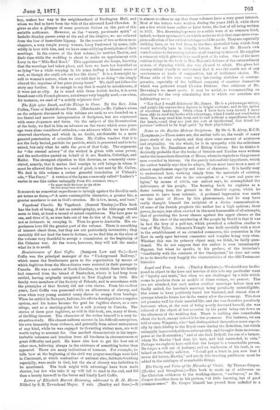Notes on the Earlier Hebrew Scriptures. By Sir G. B.
Airey, K.C.B. (Longmans.)—These notes are, the author tells us, the result of many years study of the subject, and they show some amount of acuteness and originality. On the whole, he is in sympathy with the criticisms of the late Dr. Donaldson and of Bishop Colenso. But he thinks it decidedly probable that the books of Genesis and Exodus were written under the immediate direction of Moses, whom he regards as the greatest man recorded in history. On the purely rationalistic hypothesis, which the author frankly says that he adopts, Moses must have been a man of almost superhuman sagacity and force of character. It is hardly easy to understand how, working simply from the materials of existing traditions, he could rise to the conception of a " new and pure re- ligion," by means of which, our author says, he accomplished the deliverance of his people. The burning bush he explains as a flame issuing from the ground in the Sinaitic region, which he assumes to have been volcanic. A profound impression was made on the mind of Moses by this phenomenon, and ho may have really thought himself the recipient of a divine communication. Of some of the Jewish prophets the author has a high opinion ; their power, he says, was often exerted in the most honourable of all attempts, that of protecting the lower classes against the upper classes or the king. His view of the numbering of the people by David is that it was in fact the levy of a poll-tax, which provoked a rebellion similar to that of Wat Tyler. Solomon's Temple was built specially with a view to the establishment of an extended commerce, tho connection in the East in early ages between commerce and temples boing very close. Whether this was its primary object may, we think, be fairly ques- tioned. We do not suppose that the author is ever intentionally flippant, but when he speaks, in his preface, of the historian's "familiarity with the counsels of the Omnipotent," he does not seem to us to describe very happily the characteristics of the Old-Testament histories.


































 Previous page
Previous page